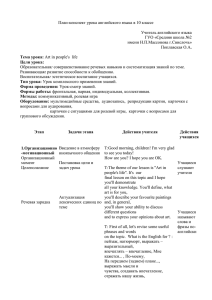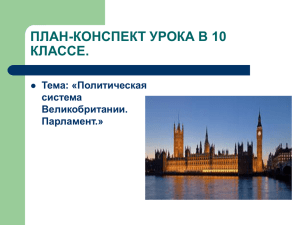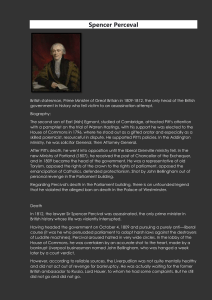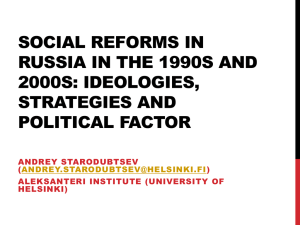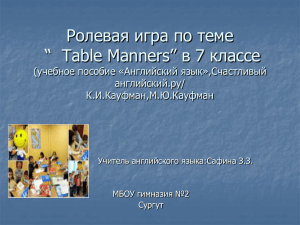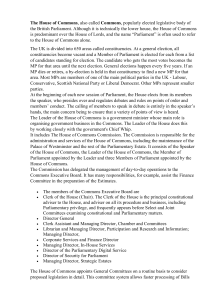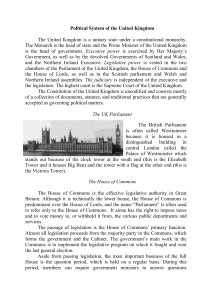План-конспект урока в 10 классе
advertisement
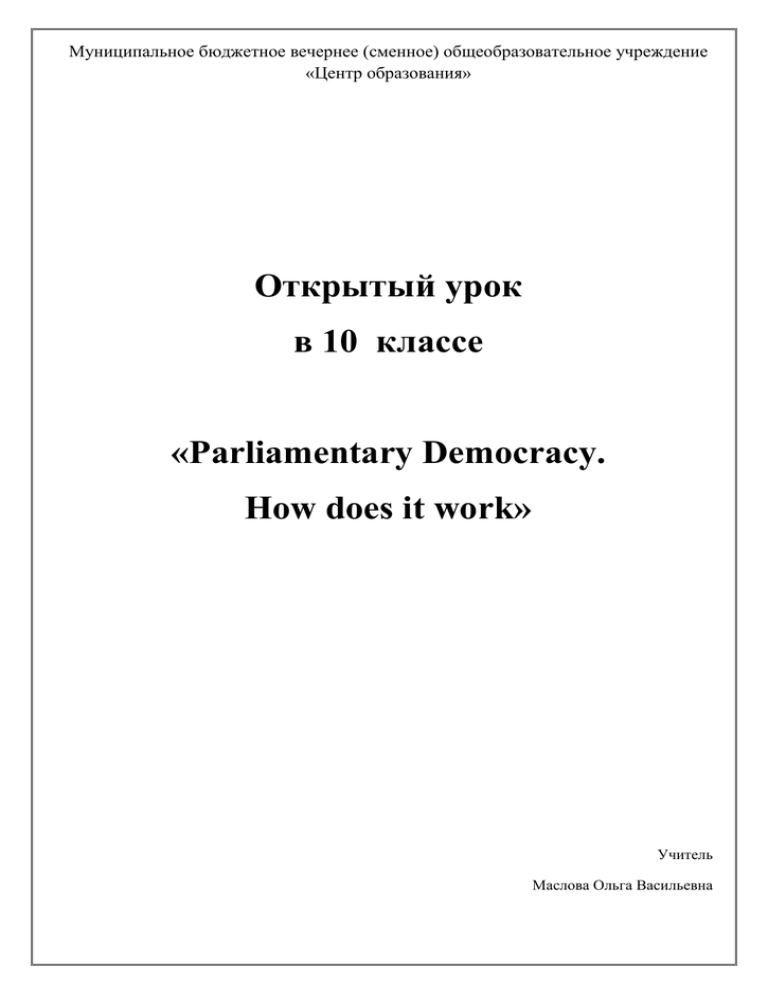
Муниципальное бюджетное вечернее (сменное) общеобразовательное учреждение «Центр образования» Открытый урок в 10 классе «Parliamentary Democracy. How does it work» Учитель Маслова Ольга Васильевна План-конспект УМК: «English» для 10 – 11 класса Авторы: В.П. Кузовлев, Н.М. Лапа, Э.Ш. Перегудова и др. Тема цикла: Западная демократия. Вымысел и реальность. Тема урока: Парламентская демократия. Как она работает? (Parliamentary Democracy. How does it work?) Цели урока: 1.Учебная: формирование лексических навыков аудирования и чтения активизация лексики темы в речевых ситуациях “agreement/disagreement”, “expressing opinion” 2. Воспитательная: осознание понятия «демократия», понимание сути демократического устройства государства. учить сопоставлять реалии разных культур 3. Познавательная: знакомство с основами парламентского государства, с конституционной монархией. познакомить с политическим устройством Объединённого Королевства Великобритании и Северной Ирландии. 4. Развивающая: развитие догадки по аналогии с родным языком и по словообразовательным элементам. Технологии (ФГОС), используемые на уроке: технология сотрудничества коммуникативные технологии информационно-коммуникативные технологии Методы и приемы, применяемые на уроке: наглядные методы: презентация, ЭОР по теме « Парламентская демократия. Как она работает?» Формы работы: индивидуальная фронтальная Методы обучения: по восприятию информации: словесные, наглядные, практические; стимулирующие: создание ситуации успеха. Представление о результатах: Личностные результаты: развитие способности учащихся к саморазвитию Усвоение учащимися лексики темы, активизация лексики в различных речевых ситуациях Демонстрационный материал: презентация, ЭОР по теме Оснащение урока: УМК, презентация раздаточные материалы ЭОР по теме Оборудование: Компьютер, проектор, экран Ход урока I. Организационный этап Цель: Подготовка учащихся к работе. Содержание: мотивация и мобилизация учебной деятельности, определение темы и целей урока. Деятельность учителя: Nowadays Many nations live under democratic systems. So, the idea of democracy is a global reality. This is our first lesson devoted to Western Democracies. What do you think “Democracy” means? How does democracy work? Is the British Monarchy anti-democratic? II. Фонетическая разминка. Цель: подготовка учащихся к речевой деятельности; отработка произношения основных ЛЕ по теме. 1. Act, ash, apple, abbey, absence, abstract, accent, actor, animal, ant, alcohol, pad, Pat, bad, bat, tag, tact, dam, dash, cab, cap, gap, man, champ, jazz, land, fan, fact, sand, sack, shad, wax, hand One man is no man. A hungry man is an angry man. Pat’s cat sat in a Pat’s hat. 2. Democracy, democratic, representatives, minister, constitution, department, parliament, parliamentary, policy, politician, political, monarch, monarchy III. Речевая разминка. Цель: Подготовка учащихся к иноязычной речевой деятельности, введение в языковую среду. Содержание: актуализация имеющихся знаний. Деятельность учителя: 1.Учитель предлагает учащимся высказать свое мнение о том, что означает слово «Демократия», используя опоры, представленные на слайде: What do you think “democracy” means? Be ready to back up your opinion. People do what they want. People rule the country. People do what they want within the framework of law. People elect their representatives to rule the country. People elect the head of the state directly. People say what they think. People can live in any place they choose. The head of the state guarantees the rights of citizens. All people and authorities follow the constitution. 2. Учитель предлагает исключить из списка слова, которые, по мнению учащихся, не относятся к понятию «демократии», и обосновать свой выбор (список слов представлен не слайде): Cross out the words that don’t match the idea of democracy. Explain your choice. Integration Separatism Ethnic harmony Liberal Peace Racism Democratic Constitutional. Деятельность ученика: учащиеся высказывают и обосновывают свое мнение. IV. Презентация новых лексических единиц по теме и первичное закрепление их. Цель: Ввести новые лексические единицы по теме, научить учащихся понимать новую лексику в определенном контексте. Деятельность учителя: Учитель предлагает учащимся выполнить следующее задание: 1. Работа с учебником – упр. 2.1)-2)- стр. 40-41 When you listen to a politician who speaks English you can understand some words without translation. Which words do you understand? Find the Russian equivalents. 2. Необходимо дать определение следующим политическим терминам. (используется раздаточный материал) In Britain there are different opinions about the monarchy. Try to identify the meaning of the following notions. Match the words with the definitions. An absolute monarch a system of government by a monarch A dictator in opposition to monarchy A constitutional monarch a ruler who has total power over his country and who ruthlessly rules the country a monarch who has unlimited power monarchy the royal family a monarch whose power is limited by a constitution anti-monarchial the family of a king or queen Деятельность ученика: 1. Учащиеся догадываются о значении интернациональных слов, рассматривают сочетаемость глаголов и существительных. 2. Учащиеся совмещают термин с определением. V. Знакомство с политическим устройством Великобритании. Цель: учить учащихся понимать новую лексику в определённом контексте. 1. Предъявление нового материала с использованием презентации Деятельность учителя: Учитель рассказывает о политическом устройстве Великобритании. ответить на вопросы по ходу своего рассказа. Предлагает учащимся 2. Работа над чтением. Цель: Совершенствовать навык чтения с различными стратегиями (полным пониманием текста и с выборочным извлечением конкретной информации ). Деятельность учителя: Учитель предлагает учащимся выполнить следующее задание (используется раздаточный материал): прочитать текст “The British Parliament and the Electoral System” выбрать наиболее подходящий заголовок из трех предложенных учителем закончить предложения в соответствии с текстом Деятельность ученика: учащиеся выбирают заголовок статьи, выполняют задания упражнений VI. Развитие лексических навыков устной речи. Цель: Формировать лексические навыки по теме, активизировать лексику темы. Деятельность учителя: Учитель предлагает учащимся выполнить следующее задание (задание представлено в презентации в раздаточном материале): учащиеся должны закончить предложения и ответить на вопросы, используя услышанную информацию. Деятельность ученика: Учащиеся выполняют задания, представленные на слайдах и в раздаточном материале (заканчивают предложения, отвечают на вопросы) Complete the facts below with the suitable words or word combinations. 1. The letters “MP” mean the _______________________________. 2. Parliament is made up of the two chambers: the ______________ and the _____________. 3. The members of the _____________ are not elected. 4. The United Kingdom is divided into_______ that have their representatives in Parliament. 5. In the United Kingdom ___________ is held every four or five years. 6. The party which wins the majority of seats in the General Election forms the _________. 7. The leader of the winning party becomes the __________________. 8. When both Houses are agreed on the debated proposal, it becomes one of the laws of the country and it is known as an _______________. 9. The members of the party of Parliament that did not win the election form the _________ to the Government. Answer the questions 1. Who is the head of the British Government? 2. How many ministers are there in the cabinet? 3. Who chooses Non-Cabinet ministers? 4. How many Houses does Parliament consist of? 5. What are they? 6. Who is in the House of Commons? 7. Who elects them? 8. How many MPs are there? 9. Who forms the House of Lords? 10. Are they elected? VII. Подведение итогов урока. Цель: подвести итоги работы учащихся на уроке. Cписок литературы и других источников, используемых учителем для подготовки к уроку: 1. УМК для 10-11 кл. ОУ. Под редакцией В.П. Кузовлева, Н.М. Лапа и др. Москва, «Просвещение». 2. Е.С. Музланова, Е.И. Кисунько «Тесты по английскому языку для подготовки к экзаменам» Астрель. Москва. 2004 3. Курс разговорного английского языка English in Action. “The Royal Family”. «Новый Диск». Москва 4. Электронный продукт (презентация) 5. ЭОР Приложение (раздаточный материал) “Parliamentary Democracy. How does it work?” I. act, ash, apple, abbey, absence, abstract, accent, actor, animal, ant, alcohol, pad, Pat, bad, bat, tag, tact, dam, dash, cab, cap, gap, man, champ, jazz, land, fan, fact, sand, sack, shad, wax, hand One man is no man. A hungry man is an angry man. Pat’s cat sat in a Pat’s hat. II. democracy, democratic, representatives, minister, constitution, department, parliament, parliamentary, policy, politician, political, monarch, monarchy III. 1.Чтение с общим охватом содержания. Какой заголовок лучше подходит к тексту? Doubts about democracy. The British Parliament and the Electoral System. The “Shadow Cabinet”. The British Parliament and the Electoral System The British Parliament consists of the House of Lords, the House of Commons and the Sovereign as its head. The House of Commons plays the major role in law-making. It consists of Members of Parliament (called MPs for short), each of whom represents an area in England, Scotland Wales or Northern Ireland. MPs are elected either at a general election (всеобщие выборы), or at a by-election (дополнительные выборы) following the death or retirement of an MP. Parliamentary elections must be held every five years, but the Prime-Minister can decide on the exact date within those five years. The minimum voting age is 18, and the voting is taken by secret ballot (тайное голосование). Britain is divided into parliamentary constituencies. Each constituency is a geographical area: the voters who live in the area select one person to serve as a member of the House of Commons. The simple majority system of voting is used in parliamentary elections. This means that the candidate with the largest number of votes in each constituency is elected, although he or she may not necessarily have received more than half the votes cast. Voting is by secret ballot. The following people may vote: all British citizens over the age of 18, citizens of other Commonwealth countries and the Irish Republic who are resident in Britain. British citizens living abroad may vote. Members of the House of Lords, foreigners, mentally ill people in hospitals, prisoners and convicted people may not vote. The election campaign lasts about three weeks. The election is decided on a simple majority – the candidate with most votes wins. An MP who wins by a small number of votes may have more votes against him (that is, for the other candidates) than for him. Many people think that it is unfair because the wishes of those who voted for the unsuccessful candidates are not represented at all. The British parliamentary system depends on political parties. The political parties choose candidates in elections. The party which wins the majority of seats forms the Government and its leader usually becomes Prime Minister. The Prime Minister chooses about 20 MPs from his or her party to become the cabinet of Ministers. Each minister is responsible for a particular area of the government. The second largest party becomes the official opposition with its own leader and “Shadow cabinet”(«теневой кабинет» министров). Leader of the Opposition is a recognized post in the House of Commons. The official title of the Opposition is Her or His Majesty’s Loyal Opposition. 2. Чтение с извлечением конкретной информации Выберите подходящие окончание для каждого предложения. A. The British Parliament… 1. consists of three bodies. 2. is the oldest in the world. 3. is re-elected every five years. 4. consists of MPs. B. A general election is held… 1. by secret ballot. 2. every five years. 3. in every constituency. 4. by simple majority system. C. To take part in a general election a person in Britain should be … 1. a British citizen over the age of 18. 2. a foreigner. 3. a member of the House of Lords. 4. a resident of the Irish Republic. D. The election campaign… 1. lasts for about three weeks. 2. is unfair. 3. depends on political parties. 4. is not representative. III. 1. Complete the facts below with the suitable words or word combinations. 1. The letters “MP” mean the _______________________________. 2. Parliament is made up of the two chambers: the ______________ and the _____________. 3. The members of the _____________ are not elected. 4. The United Kingdom is divided into_______ that have their representatives in Parliament. 5. In the United Kingdom ___________ is held every four or five years. 6. The party which wins the majority of seats in the General Election forms the _________. 7. The leader of the winning party becomes the __________________. 8. When both Houses are agreed on the debated proposal, it becomes one of the laws of the country and it is known as an _______________. 9. The members of the party of Parliament that did not win the election form the _________ to the Government. 2. Answer the questions 1. Who is the head of the British Government? 2. How many ministers are there in the cabinet? 3. Who chooses Non-Cabinet ministers? 4. How many Houses does Parliament consist of? 5. What are they? 6. Who is in the House of Commons? 7. Who elects them? 8. How many MPs are there? 9. Who forms the House of Lords? Are they elected?
